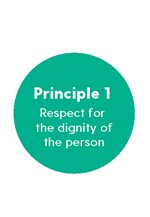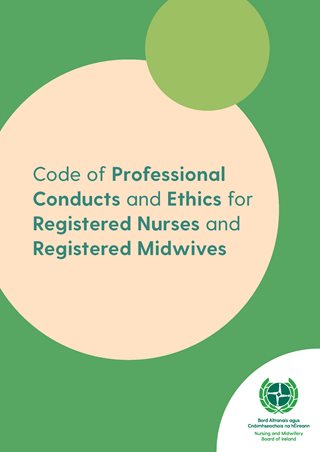Principle 1: respect for the dignity of the person
 This principle is drawn from the Universal Declaration of Human Rights (United Nations, 1948) which proclaims that the basis for freedom, justice and peace is founded on the recognition of the inherent dignity and equality of human beings.
This principle is drawn from the Universal Declaration of Human Rights (United Nations, 1948) which proclaims that the basis for freedom, justice and peace is founded on the recognition of the inherent dignity and equality of human beings.
The European Convention for the Protection of Human Rights and Fundamental Freedoms (Council of Europe, 1950), the Constitution of Ireland (Government of Ireland, 1937), the Equal Status Acts (Government of Ireland, 2000–2018 and the United Nations Convention on the Rights of Persons with Disabilities, 2007 (ratified by the Government of Ireland, 2018) also serve as references for the values and standards established for respecting the dignity of the person.
Values
- Nurses and midwives respect each person as a unique individual.
- Nurses and midwives respect and defend the dignity of every stage of human life.
- Nurses and midwives respect and maintain their own dignity and that of patients in their professional practice. They believe that this respect is mutual with patients.
- Nurses and midwives respect each person’s right to self-determination as a basic human right. In respecting the right to self-determination, the requirement of informed consent is key. Except in exceptional circumstances, it is a violation of patients’ rights to treat them without their consent. It
is presumed that all adults have capacity to make healthcare decisions. Capacity is understood as the ability to understand, deliberate and communicate a choice in relation to a particular healthcare decision at a particular time.
- Nurses and midwives respect all people equally without discriminating on the grounds of age, gender, race, religion, civil status, family status, sexual orientation, disability (physical, mental or intellectual) or membership of the Traveller community.
Standards of conduct
- You must respect each person as a unique individual.
- You must respect and maintain the dignity of every stage of human life.
- You have a responsibility to make every valid or reasonable effort to protect the life and health of pregnant women and their unborn babies.
- You must respect a woman’s legal right to a termination of pregnancy within the provisions of the Health (Regulation of Termination of Pregnancy) Act 2018.
- You should respect an individual’s advance healthcare directive if you know they have one.
- In end-of-life care, you should support the person to die with dignity and comfort. This extends to ensuring respect for the patient in the period after their death, taking into consideration the cultural norms and values of the patient and their family.
- If you have a conscientious objection, you may refuse to provide care, or to participate in any procedure or treatment which conflicts with your ethical or moral values. (Standards of conduct 6 and 7 in Principle 2 Professional Responsibility and Accountability – conscientious objection – are linked with this standard.)
- You must strive to communicate with patients about their care and give them information in a manner they can understand.
- If patients have communication or language needs, you should try to ensure that services are put in place so that you can communicate effectively with each other.
- You should protect and promote the autonomy of patients: respect their choices, priorities, beliefs and values. Decisions to refuse care or treatment should trigger further discussion and be respected in the context of the person’s capacity.
- You are responsible for seeking the patient’s consent to nursing and midwifery treatment and care. Never presume a patient’s consent. The consent is valid if:
- information is communicated in a clear manner about the nature, purpose, benefits and risks of treatments and care in a way the patient can understand
- the patient has the capacity to make a decision about a particular procedure
- the patient gives their agreement freely
12. If a patient seems to lack understanding or capacity and is unable to communicate a choice about a treatment or procedure, you should give them the time and support they need to maximise their ability to make decisions for themselves. If you are still unsure about a patient’s capacity to make healthcare decisions, that patient’s capacity should be assessed by their doctor and other members of the healthcare team. If it is determined that a patient lacks capacity, you should:
- take into account the person’s previous directions and wishes, if known
- discuss the case with appropriate family members, carers or guardians
- discuss the case with other members of the healthcare team
- take into account (if possible) the expressed views of the person who lacks capacity in making a treatment or care decision (Standards of conduct 4 and 5 in Principle 4 Trust and Confidentiality – discussing personal information – are linked with this standard.)
13. In exceptional circumstances, such as emergencies where a patient lacks capacity, consent to treatment or care is not necessary.
You may treat the person when it is immediately necessary to save their life or to prevent a serious deterioration in their condition and there is no advance refusal of treatment.
14. You must ensure that the rights and best interests of those who lack capacity are at the centre of all decision-making processes concerning their care and welfare.
15. You must respect diversity among patients and colleagues in your professional practice.
16. You must respect all people equally and not discriminate on grounds of age,gender, race, religion, civil status, family status, sexual orientation, disability (physical, mental or intellectual) or membership of the Traveller community.
Supporting guidance
Advance healthcare directives
Advance healthcare directives have been recognised by the courts in Ireland. The Irish courts have established that a person with capacity has the right to refuse treatment.
Guidance from healthcare regulators and other agencies may help to inform you about best practice regarding the ethical and professional issues associated with advance healthcare directives.
An advance healthcare directive should be respected on condition that:
- the person made an informed choice regarding their decisions at the time of making the plan
- the decision in the directive covers the situation that has now arisen
- there is no indication that the person has changed their mind since the advance care directive or plan was made.
Further information about advance healthcare directives can be found on the Department of Health website and on the Mental Health Commission (MHC) website.
The Assisted Decision-Making (Capacity) Act 2015 is a legal framework that supports individuals who lack or may be deemed to lack capacity. It uses a functional approach to decision-making and places the obligation on all those working in healthcare to support a person whose capacity may be in question to maximise their ability to be part of the decision-making process. This includes advance healthcare directives.
A functional approach to capacity entails assessing a person’s capacity in a time specific and issue specific way.
A cognitive impairment is relevant only if it affects capacity. A government decision support service under the auspices of the Mental Health Commission (MHC) has been set up to regulate and register support arrangements and to supervise the actions of legally appointed decision supporters.
Consent
Your communication and information sharing is key to the patient understanding and consenting to nursing or midwifery care. The need for consent extends to all nursing or midwifery intervention with patients in all settings. How the key elements of consent are applied, such as listening to and supporting the patient to ensure that their consent is freely given and considered, will vary with the particular situation. The amount of information that you should provide about an intervention will depend on the urgency, complexity, nature and risks associated with the intervention.
The verbal or implied (for example by a gesture) consent of patients to normally risk-free nursing or midwifery care is a sufficient indication that the consent is valid. As with medical interventions, the consent of patients to more serious and higher risk procedures should be informed, written consent. There must be no doubt that informed consent was given and it is documented in the nursing or midwifery notes and the patient consent form.
There may be occasions when a patient’s state of health may prevent them taking part in the consent process. Health legislation, such as the Assisted Decision-Making (Capacity) Act 2015 (once fully commenced), the Mental Health Act 2001, supporting guidance from the MHC and employer policy also direct best practice.

Code of Professional Conduct and Ethics for Registered Nurses and Registered Midwives
.pdf Download (279KB)
Download